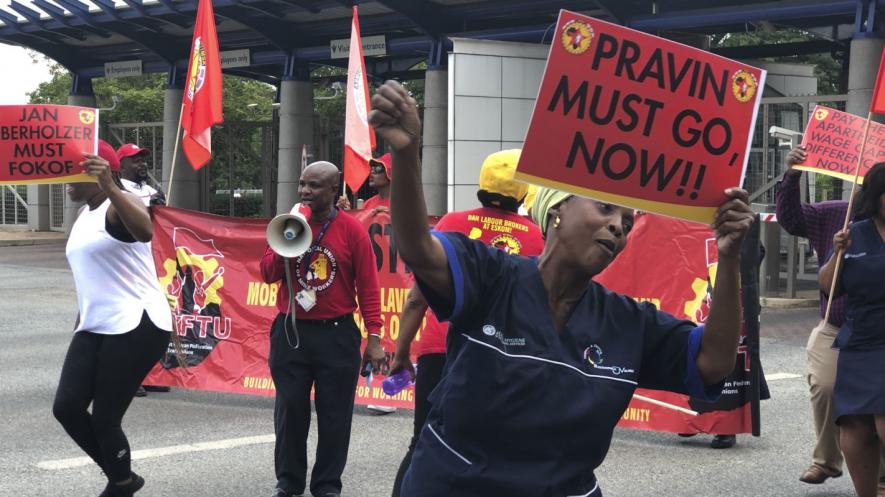The Crisis of South Africa’s Energy Company and Unions’ Plan to Save it

NUMSA and NUM held a picket outside Eskom's Megawatt Park in Johannesburg on January 15. (Photo: Chanel Retief)
As the crisis at Eskom continues to deepen, the National Union of Metalworkers of South Africa (NUMSA) and the National Union of Mineworkers (NUM) are preparing for a national strike in the first quarter of this year, to defend the South Africa’s state owned energy producer from unbundling and privatization.
The dates for the strike action is yet to be finalized, following which a notice will be served and an official call given, NUMSA’s national spokesperson, Phakamile Hlubi Majola, told Peoples Dispatch.
Yesterday, the two unions jointly organized a picket at the company’s Megawatt Park in Johannesburg on January 15. In a memorandum of demands submitted to the management, the unions called for an immediate end to the unbundling of Eskom, which has been touted by the government as a “rescue plan”.
“The unbundling of Eskom will not solve [its] problems” said NUMSA’s national spokesperson Phakamile Hlubi Majola. “Eskom’s problem, as we all know, are related to the fact that it is hugely in debt, it is technically insolvent, and by breaking it up into three parts, you are not solving that problem.”
Reeling under this financial stress, Eskom has undertaken historically unprecedented levels of load-shedding over the last year, which has taken a severe toll on the country’s overall economy.
Eskom’s crisis has affected South Africa’s overall economy
Load-shedding has been widely regarded as one of the main factors behind the fact that South Africa’s economy in 2019 grew at a mere 0.7%, as opposed to the predicted 1.7%. The country’s credit rating has been sharply downgraded by international agencies.
Widespread job losses due to energy crisis, especially in the manufacturing and mining sector, has hugely contributed to the unemployment level, which rose last year from 27.6% – a record high since the 2008 global financial crisis – to almost 30%.
Amid this crisis, on January 10, Jabu Mabuza resigned from the post of the CEO of Eskom. According to a statement from the office of the country’s President Cyril Ramaphosa, “Jabu Mabuza apologised for Eskom’s inability to meet the commitment it made to the President and Deputy President at a meeting on 11 December 2019” that plans were in place to ensure there will be no load shedding till January 13, 2020.
Two days prior to the meeting, on December 9, Eskom implemented a historically unprecedented stage 6 load shedding, where 6000 megawatts of energy had to be shed from the national grid to prevent its failure.
After the meeting, President Ramaphosa had assured the public that there will not be any load-shedding between December 17 and January 13. However, the breakdown of generators continued, and with it the load-shedding.
On January 14, media reports claimed that Eskom had asked the municipalities to prepare for Stage 8 load-shedding. Calling these reports “erroneous and incorrect”, Eskom published a press statement which stated that “Stage 8 equates to approximately an 8000 MW deficit. The likelihood of reaching Stage 8 is low.”
Stepping in for President’s defense amidst this crisis, the Deputy President of the country and of the ruling ANC, David Mabuza, claimed that Ramaphosa was “misled” about the extent of the problem with Eskom’s generators by CEO Jabu Mabauza and Public Enterprises Minister, Pravin Gordhan.
While welcoming Mabauza’s resignation, NUMSA, in a statement on January 12 by its national spokesperson, Phakamile Hlubi Majola, said: “we do not buy his cheap tactic of simply taking the fall for misleading the President. Our honest view is that the entire incompetent Eskom board must go including the COO, Jan Oberholser who has added absolutely no value except adding to the wage bill.”
This board, NUMSA has demanded, should be replaced with another one, at least 70% of which are comprised of engineers, the most competent of whom, the union alleges, have been marginalized or forced to quit by the current board. The board must also include representatives from unions, along with those from civil society and the business sector.
In its statement NUMSA has also demanded the sacking of Public Enterprises Minister Gordhan, and calls on the President “to take decisive action and a decision to appoint a new Minister of Public Enterprises in the best interest of the country for all the other SOEs.”
The “rescue plan” Gordhan had presented and President Ramaphosa had approved, is in effect an acceleration of the very same policies which the unions claim have brought Eskom to ruin.
The crisis of Eskom
At the root of the Eskom crisis is the drain of its revenue into the coffers of privately owned Independent Power Producers (IPP) and into the coffers of private companies which have ratcheted up the prices after taking over the ownership of coal mines which were previously held by Eskom.
Global giants such as Glencore, South32, Anglo, Exxaro and Liketh took ownership of mines previously controlled by Eskom were handed over. As a result, Eskom relies on these companies to supply it with the coal required to produce electricity.
“It is these companies that have been driving high electricity tariffs because they charge exorbitant coal prices to Eskom,” NUMSA maintains. “Instead of moving decisively [against these companies] to…nationalize coal as our country’s strategic mineral,” Gordhan continued to make concessions for their profitability.
While having lost control over the supply of coal for power production on the one hand, Eskom has also been gradually losing control of the power generation itself. Since 2015, instead of investing capital into extending the lifespans of the electricity generation units which are now very old, the government has been decommissioning them and spending this money on paying private IPPs to supply to the grid. This is despite the fact that Eskom has the capacity to produce electricity at much lower costs that what is charged by the IPPs.
As a result, in 2015, out of the R8.2 billion (USD$570 million) generated from tariff increase, R6.5 billion (USD$451.9 million) went as payments to the private IPPs that have contracts with Eskom for power supply. The following year, when Eskom had “enough capacity to generate a unit of electricity at…[R0.42] (USD$0.029) per kilowatt hour,” more unnecessary contracts were signed with IPPs, which then sold power to Eskom at a much higher price, causing the SOE a loss of R9 billion (USD$625.9 million).
Again, in 2018, the then Energy Minister Jeff Radebe, on behalf of Eskom, signed another R56 billion (USD$3.89 billion) contract with 27 more IPPs, despite the strong opposition by the unions. That year alone, R21.3 billion (USD$1.48 billion) was spent on paying the IPPs, from which Eskom bought electricity at R2.22 (USD$0.15) per kilowatt and sold at R1.38 per kilowatt hour, costing the company a loss of R13 billion (USD$904).
In the meantime, the private IPPs are making profits at the cost of Eskom. This is not because the private companies are inherently better at adapting to the changes in supply and demand. On the contrary, the “must buy first principle,” on the basis of which government-guaranteed Power Purchasing Agreements have been signed with the IPPs, ensure that these “IPPs are guaranteed payment from Eskom whether or not there is a demand,” according to NUMSA.
According to the joint memorandum submitted by NUMSA, Eskom in the recent period has been buying power from IPPs at R4.04 ($0.28) per kilowatt and selling it to public at R0.83 ($0.058) per kilowatt, as a result of the nature of these contracts.
This government-imposed resource drain on the SOE has left Eskom with little capital to invest in extending the lifespan of its generators, which have exhibited signs of deterioration since 2015.
Unions have been demanding a reversal of these policies. Specifically, they are demanding the cancellation of the exorbitantly priced contracts handed over to the private IPPs. In its place, the power-production tasks should be insourced into Eskom, and money saved from cancellation should be invested into extending the lifespan of existing generators or acquiring new capacity.
Unions resist the government’s ploy for privatization
The government, on the other hand, is using the very fact that most of its generators are reaching the end of its lifespan to justify the decommissioning of more plants from the SOE and replacing them with more contracts to private IPPs.
The need to transition from coal to renewable energy is also being opportunistically used by the government to justify the policy of decommissioning publicly owned coal plants and outsourcing the energy requirement to privately owned Renewable Energy Independent Power Producers (REIPPs).
While both Gordhan and President Ramaphosa have time and again sought to reassure the public that the government is not seeking to privatize Eskom, NUMSA has called it “a lie”.
“[I]n actual fact every power station that is being decommissioned is being replaced on the grid by REIPPs. REIPPs are owned by the private sector and therefore this constitutes nothing but privatization.”
Hlubi Majola warns that “privatization of Eskom will mean that electricity will become even more expensive and inaccessible to members of the working class and the poor. Only a cheap [supply of] electricity, through a state-owned entity like Eskom, can.. ensure that we have a regular power supply and allow.. our economy to grow in the long-term.”
NUMSA, which has for long advocated a transition to clean energy, is not opposed to a transition to renewable sources. The transition, however, “must be at a pace and cost that the country can afford,” the union insists. “As things stand, with coal you can produce electricity at a rate of.. [R0.55] ($0.038) per kilowatt hour, but with REIPPs you will produce that same electricity at a whopping R2.35 ($0.16) per kilowatt hour.”
Instead of handing over the strategic power sector to overcharging private players under the cover of transitioning to renewable energy sources, NUMSA calls for a socially-owned renewable energy sector, created by setting up “Eskom Renewable Energy Company that will execute 70% of the” renewable energy projects set out in the Integrated Resource Plan (IRP) 2019. All the projects set out in this document are to be completed by 2030.
In order to back up their demands, the unions are mobilizing for a series of actions. The picket yesterday was “just one of a series of marches and demonstrations”, Hlubi Majola asserts. “There is even a possibility of a national strike which we are calling for, as NUMSA and NUM, in order to defend Eskom against unbundling and privatization.”
Get the latest reports & analysis with people's perspective on Protests, movements & deep analytical videos, discussions of the current affairs in your Telegram app. Subscribe to NewsClick's Telegram channel & get Real-Time updates on stories, as they get published on our website.
























